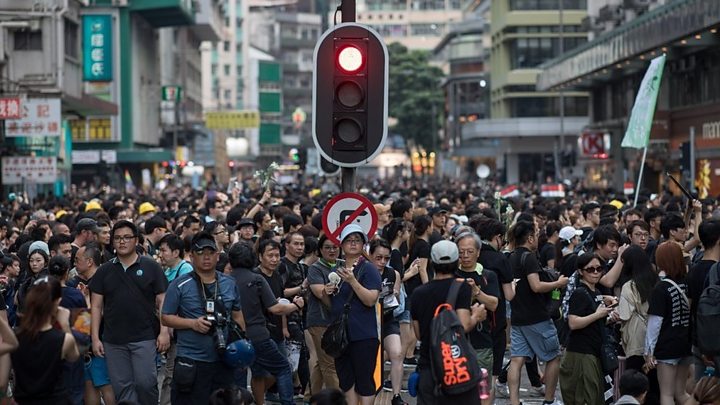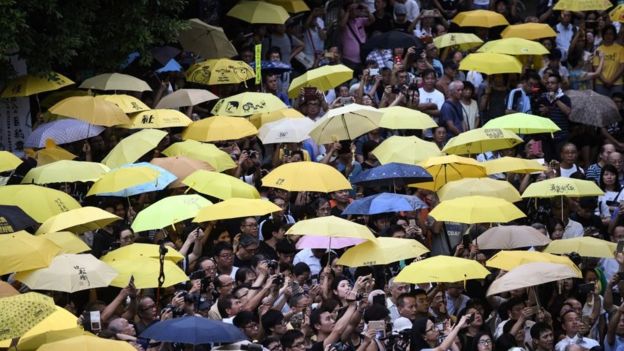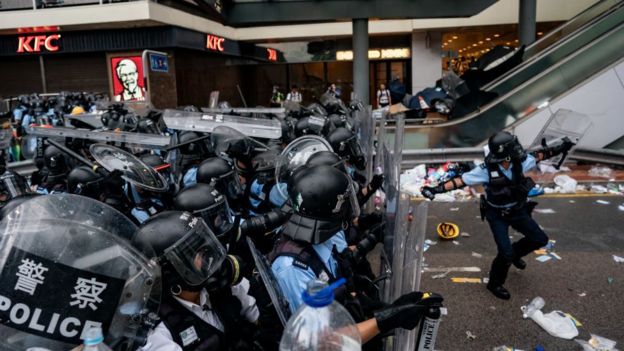Hong Kong’s most prominent student activist Joshua Wong has called for the resignation of leader Carrie Lam, after walking free from prison.
Wong, 22, became the face of the 2014 pro-democracy protests which called for the city to pick its own leaders.
People in Hong Kong are again out on the streets, this time against a controversial bill which allows extradition to mainland China.
Observers say Wong will further rally crowds and increase pressure on Ms Lam.
Organisers say more than two million people rallied against it on Sunday, despite the bill being suspended by Ms Lam on Saturday. The police put the figure at 338,000.

Critics have said the legislation would expose people in Hong Kong to China’s deeply flawed justice system and lead to further erosion of the city’s judicial independence.
Much of the public anger has been directed at Ms Lam, who is pro-Beijing, and on Sunday she apologised for the controversy over the bill.
After diminishing in numbers overnight, large groups of protesters were seen gathering on key roads near the government headquarters again on Monday. Organisers say protests will continue until the bill is scrapped altogether.
- All you need to know about the protests
- China’s history of extraordinary rendition
- The scale of the march in pictures
- ‘Shield Girl’: The face of Hong Kong’s protests
Who is Joshua Wong?
Wong, who received two separate prison sentences in 2017 and 2018 for his part in what became known as the Umbrella Movement, walked free on Monday after serving a reduced sentence of one month.
Speaking to reporters outside the prison he said “[Carrie Lam] is no longer qualified to be Hong Kong’s leader.”
“She must take the blame and resign, be held accountable and step down.”
He also celebrated his new found freedom and called for the extradition bill to be withdrawn in a tweet on Monday.
The recent wave of protests in Hong Kong is reminiscent of the Umbrella Movement that took place in 2014.
It started in reaction to a decision made by China that it would allow direct elections in Hong Kong in 2017, but only from a list of candidates pre-approved by Beijing.
Wong and other student activists led the protests which saw thousands of people camp in the central business district for 79 days, bringing the city to a standstill.
 Image copyright ANTHONY WALLACE The Umbrella Movement paralysed parts of the city in 2014
Image copyright ANTHONY WALLACE The Umbrella Movement paralysed parts of the city in 2014The student activists were later convicted of unlawful assembly and jailed over an incident that helped trigger the mass protests.
Four other pro-democracy activists, including university professors and a Baptist minister, also received sentences for their part in the protests.
Why are people taking to the streets?
Organisers say almost two million people turned up for mass protests across key areas of the city on Sunday. It would be the largest protest in Hong Kong’s history if the numbers are confirmed.
The protest was mainly peaceful, with police officers reportedly holding back to allow the throngs of people to slowly pass through the city.
This is in contrast with scenes at the last major demonstration on Wednesday, which saw clashes between protesters and police that injured dozens.
Police, who used tear gas and rubber bullets, have been accused of excessive force by some rights groups.
 Image copyrightGETTY IMAGES Police have been accused of using excessive force against protesters
Image copyrightGETTY IMAGES Police have been accused of using excessive force against protestersThere are fears that the extradition bill could bring Hong Kong more decisively under China’s control.
But Hong Kong officials said its courts would have the final say whether to grant extradition requests.
Ms Lam’s government had also said suspects accused of political and religious crimes would not be extradited, insisting legally binding human rights safeguards would also be in place.
What’s the relationship between Hong Kong and China?
Hong Kong was a British colony from 1841 until sovereignty was returned to China in 1997.
It is now part of China under a “one country, two systems” principle, which ensures that it keeps its own judicial independence, its own legislature and economic system.
But though most people in Hong Kong are ethnic Chinese, the majority of them don’t identify as Chinese. The years since handover have seen an increase in anti-mainland Chinese sentiment.
Hong Kong still enjoys freedoms not seen on mainland China – but critics say they are on the decline.
One protester said Hong Kong would “become another Chinese city if [the] bill is passed”.